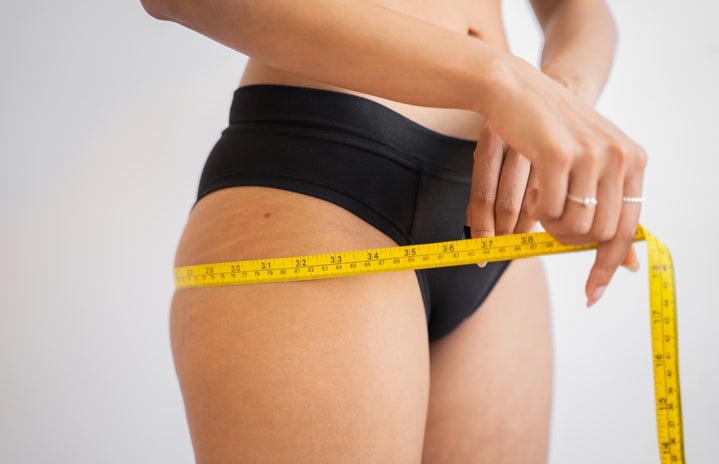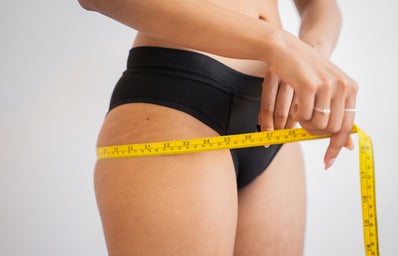*Trigger warning: Eating disorders, fat shaming.
Since this week is National Healthy Weight Week, I thought it was important to talk about the subject of healthy weight in a semi-new point of view. It’s no secret that society has pushed standards on all of us to be thin, which may lead us to praise thin and long to be thin. If we do not meet this set “beauty” standard of weight, it may have devastating consequences including insecurities, low self-esteem and eating disorders.
Recently, millions of people on social media have brought more attention to this issue and are focused on body positivity; loving all body types as they are because every body type is beautiful and deserves to be loved. When I came across a TikTok made by @devonelizabethplz on my “for you page,” a message was shared to me about reframing the word ‘fat.’ Her video caught my attention because not only is she talking about body positivity, but she brings up an important message surrounding the word ‘fat’ that I believe should be heard loudly.
Devon’s main content consists of debunking stereotypes, sharing her experience as someone who is fat living in a society where her body type is not widely accepted, and most importantly, reframing the word ‘fat’ from a derogatory term to a neutral or positive term (@devonelizabethplz 12/14/20). After watching many of her TikToks, I wanted to share some important points from her videos.
1. When describing your own insecurities, do not use other people’s body types.
The word ‘fat’ has been used to dehumanize and humiliate people. When someone who is not fat uses the word ‘fat’ to describe themselves, it’s insulting and inconsiderate because they are using the word in a negative and derogatory way as they do not have the same experiences as people who are big. This also makes it more difficult to change the meaning of ‘fat’ to a neutral/positive term. There are many alternative words you can use to describe personal insecurities instead of using a body type (@devonelizabethplz 12/4/20).
2. Do not be afraid of the word ‘fat’.
Part of changing ‘fat’ into a neutral or positive term is not being able to say the word itself. Fat is not a curse word, fat is not a bad thing and fat is not something to be scared of. Devon Elizabeth brings her own experience into this point explaining that when she calls herself fat, people will tell her she’s not and that she’s beautiful, which implies you cannot be fat and beautiful at the same time. (@devonelizabethplz 8/31/20).
3. People who have a fat body type can have eating disorders too.
Generally, people associate eating disorders, such as anorexia and bulimia, with people who are thin. The truth is you can be any body type and struggle with any eating disorder. Lots of issues and underlying judgements lead people to believe that only thin people can struggle with anorexia and bulimia, specifically, but one of the biggest issues that big people with anorexia or bulimia face is people invalidating their struggle of starving themselves because they are not thin. This is rooted in fat shaming because they have a conscious or unconscious belief that it’s better to starve yourself to lose weight than it is to be fat. One of my favorite poems written by Blythe Baird titled When the Fat Girl Gets Skinny, perfectly explains this problem based on her own experience; “if you develop an eating disorder when you are already thin to begin with, you go to the hospital. If you develop an eating disorder when you are not thin to begin with, you are a success story.” If you watch her poem on Youtube, please note this trigger warning for anorexia (very descriptive struggles), talk of calories, and fat shaming.
4. Diet culture can be toxic.
A healthy diet is not always a bad thing, but it can become a bad thing with the wrong diet, and the culture behind it can be toxic. We are constantly bombarded with commercials for weight loss, supplements and diet plans on the media that all portray people getting more attention when they lose weight and telling us we can lose weight quickly and should in order to feel better about ourselves, which in turn shames people who have bigger body types. Your self-worth is not determined by your body type or body weight. Devon shares her diet experience and traumas from these experiences in many of her TikToks and makes the important note that “diet culture prioritizes your appearance over your health and how you feel” (11/11/20).
5. Fat is a body type, not a feeling.
Fat is a body type just like thin and muscular are body types. Although this point is self-explanatory, it’s important to note that saying things like “I feel fat” is fat shaming and further pushes the negative idea that being fat is not okay and puts the burden of the word onto fat bodies.
6. Certain things that thin people do are not socially accepted if you’re fat.
In my opinion, Devon’s most important TikToks to watch are the ones where she is listing off things that are socially acceptable when you’re thin but not when you’re fat. This allows people to see how deeply ingrained the beauty standard is in all of our minds and the different experiences people go through simply because of the body type they have. Just like the other points I talked about, this stems from fatphobia. Society generally believes that people should be ashamed of themselves if they’re fat, hide their bodies and not be confident. Some things that Devon listed off saying “I’m tired,” wanting to eat sweets/candy, not exercising, having baking as a hobby, asking someone to grab something for you because you’re laying down, and not being able to go to your doctor about a medical issue because they will attribute your medical problems to your body weight (11/24/20).
7. Fat shaming and health shaming contributes to obesity.
To be perfectly clear, fat shaming is very different from health shaming. Someone who is fat can be active and healthy, and just because someone has a bigger body type does not mean they have health issues. The way we treat people has a huge impact on others. If we treat people badly and dehumanize people for having bigger body types, they’re going to learn and internalize that they’re body type is somehow wrong, not beautiful, and not okay. Fat shaming and health shaming are recognized as contributors to obesity and are proven to cause further weight gain (@devonelizabethplz 11/18/20).
Fat shaming is a huge issue in our society, even with the efforts being made in the body positivity movement. However, by learning about other people’s experiences, understanding others and hearing new perspectives, we as a society can change our own thoughts and behaviors.



